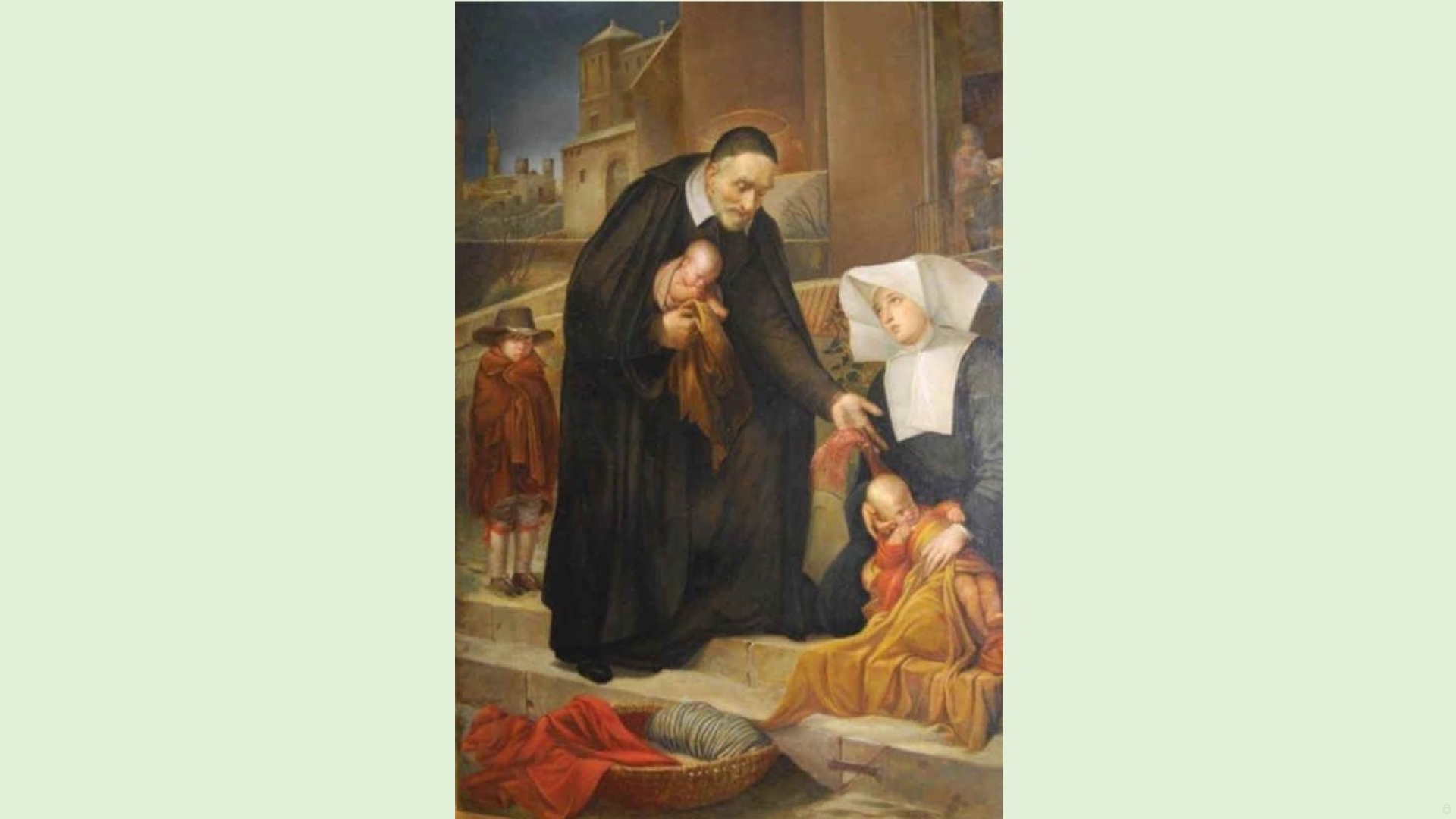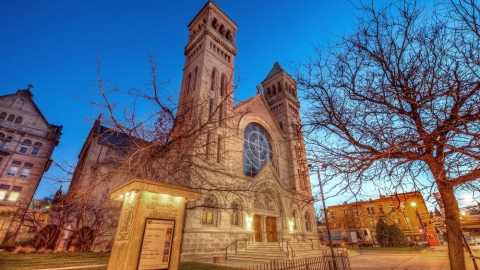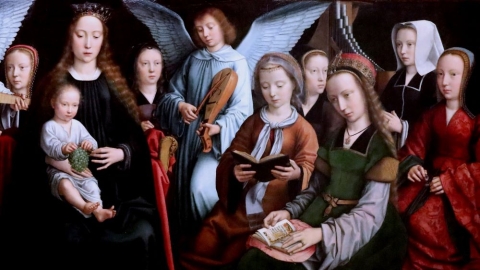The Holiness of the Church (7): The Virtue of Charity-2

St. Vincent de Paul
We have seen in the previous article that charity is above all the love of God, but also that it cannot be real if it does not extend to our neighbor. The love of God, which cannot be seen, manifests itself in the love of neighbor, who is called to participate in divine charity.
Charity Towards the Just
Well-ordered charity is addressed first to the neighbor most loved by God, that is, to the saints themselves, whether they live on earth or are already in heaven. In this sense, there can be no saint who does not love the Virgin Mary, the human person most loved by God and therefore the most worthy of being loved, more than any other creature.
It is precisely in this sense that devotion to the Virgin Mary is a sign of predestination, because it indicates the main Christian virtue, charity. One is even embarrassed to choose examples of such devotion among the saints, who competed in the manifestation of such deep love for the Blessed Virgin.
Love for the just in heaven is a devotion to the saints themselves who have already been saved, in communion with the one common Good, God himself. Let us think of the love of St. Ambrose for the relics of the martyrs, which he wanted to see honored and buried with splendor, according to the custom learned from the ancient Christians.
Let us think of those saints who, already during their lifetime, maintained mystical relations or deep veneration with the citizens of heaven: St. Edward of England with the St. John the Evangelist, St. Teresa of Avila with St, Joseph, and St. John Chrysostom with the Apostle Paul.
But love of the just is also the concern of the best souls here below: even in the great variety of the missions of the individual saints, a multifaceted reflection of the simplicity of divine love, the saints have above all taken care of the souls most close to God in their desire for perfection.
This is why so many saints have founded religious orders and given wise rules and instructions for following Jesus Christ in the way of the evangelical counsels. Others have reformed these orders, or have occupied themselves with forming truly holy priests, or again with exhorting Christian souls to perseverance by spiritual direction, or by the creation of schools and works of formation.
Charity Towards Sinners
The zeal of the saints towards those who, although able to love God with charity, and perhaps even baptized, nevertheless lived far from the commandments, was the manifestation of the charity which wants to spread that Good which remains undivided even when it is shared among many.
The spirit of the Sacred Heart and of the Good Shepherd of the Gospel urges the saints to seek out the lost sheep to lead them to penance, also giving them the concrete means of redemption.
The preaching of penance characterized characters like St. Vincent Ferrer or St. Bernardin of Siena, who led entire populations to conversion. In their very severity towards evil appeared their love for souls, whom they wanted to see safe from damnation.
The attendance at the confessional of the holy Curé of Ars remains a shining example of a constant availability to represent on earth the God of mercy who constantly calls sinners to love Him. No man was without hope of salvation for these great confessors, who intimately knew how much God loves His creatures: even criminals were loved and followed by the saints, as shown by the example of St. Joseph Cafasso, who accompanied the condemned to the gibbet.
The zeal of true pastoral charity was also that of the holy bishops, like St. Charles Borromeo, who did not hesitate to apply the sacred canons in all their rigor, so that sin and scandal did not spread among the clergy and the people entrusted to them.
Charity Towards Non-Catholics
Even with regard to those who have lost the Faith or never had it, such as pagans, Jews or heretics, the saints manifested all aspects of divine charity. We think first of all of the great missionaries, who feared no inconvenience as long as Christ was known and loved by all.
The apostolic work of St. Francis Xavier or others who shed their blood as martyrs for preaching has no equivalent outside the Church. The missionary zeal of Catholicism is perhaps one of the finest signs of that charity which only the true Church can possess and which (for example) the Eastern schismatics have never been able to match near or far.
With regard to heretics, we know the missionary charity of St. Francis de Sales who, with extreme gentleness, brought back tens of thousands to the Church; before him, St. Dominic, armed with poverty and doctrine, faced Cathar propaganda, reflecting in himself the true evangelical life. The very works of the holy doctors flow from charity towards neighbor, to give the reason for the faith and prevent the perversion of doctrine.
Even the saints who had to confront heretics and infidels militarily or judicially did so by being animated by true charity: it was love that also pushed St. John of Capistrano or St. Pius V to direct or organize great military expeditions, love for souls endangered by the destructive action of the enemies of the Church.
The saints who fought heresy and schism in the courts of the Church, even giving their blood, like St. Peter of Verona [St. Peter Martyr] against the Cathars or St. Josaphat against the Eastern schismatics, were animated by a similar spirit.
Material Charity
There is no saint who has not had it in his heart to meet the material needs of his neighbor, following the commandments and the example of the Saviour. The corporal works of mercy constitute one of the clearest apologetic arguments in favor of the holiness of the members of the Church, readable by anyone.
It would be impossible to exhaust the saints' examples of love for the poor and the sick. Since the sale of the patrimony of the Roman Church in favor of the poor by the Archdeacon St. Lawrence and the mantle of St. Martin, a long trail of good works illuminates the life of the Catholic Church.
The hospitals of St. Elizabeth of Hungary, St. John of God, and St. Camille, the orphanages of St. Jerome Emilien, the innumerable works of charity of St. Vincent de Paul, the loving care given to beggars by St. John of Kenty or St. Thomas of Villeneuve.
The schools for poor children of St. Joseph Calasanz and Don Bosco; the Monts de Pieté to save the people from the clutches of usury, founded in the 15th century by Blesseds Michele Carcano and Bernardin de Feltre; no area of human need has escaped the action of the saints.
Many of them did not hesitate to expose themselves to the dangers of life or contagion to help the sick: we know that St. Louis de Gonzague contracted the plague while relieving the sick, without sparing himself.
Charity Towards Enemies
The supreme sign of gospel love is love for those who harm us, following the example of the Saviour. Such an act goes beyond human strength and testifies to the intervention of the gifts of the Holy Spirit.
All martyrs since St. Stephen have forgiven their persecutors, wishing for them the same blessed destiny into which they entered. This was the case of St. Maria Goretti (1890-1902) who, on her deathbed, speaking of her assailant, said to her mother: “For the love of Jesus, I forgive him; I want him to come with me to Heaven.”
St. Jean Gualbert, moved by grace, forgave the murderer of his brother, on whom he had had the opportunity, according to the barbaric custom of the time, to exercise his vengeance. This is where his conversion came from.
The diversity of the action of the saints in the exercise of the one charity is the multifaceted human expression of the simplicity of divine love: only the Catholic Church has been able to produce such a great and constant variety, precisely because she is the only one to reflect God's charity on earth.
Related links
(Sources : DTC/Prümmer – FSSPX.Actualités)
Illustration : Flickr / Fr Lawrence Lew, O. P. (CC BY-NC-ND 2.0)





